Namrata, Luis, Tanvi, Anna, and Lachlan of the Fixing the Future team were in Uppsala for the Nordic Human Computer Interaction Conference 2024 last month.
They were there running a workshop and presenting three papers. Below are some reflections from the researchers who were there on their experience and a bit of background on the work.
1. Namrata and Luis Ran the workshop ‘Silicon Heaven: A Workshop Exploring IoT Sustainability through Religion‘
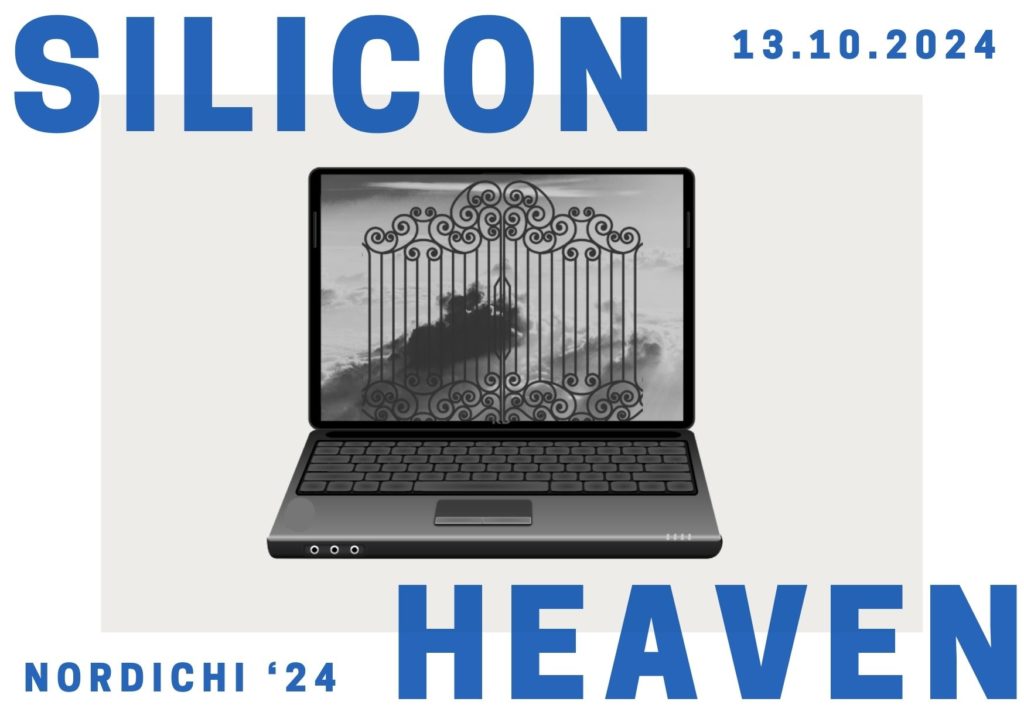
Namrata has provided some context on the scope of the workshop and how it went on the day. Sustainability is an important ethical issue in IoT research, but the complexities of this problem make it challenging to discuss in the design process [4]. Designing ethical IoT devices is increasingly relevant as IoT objects begin to emulate human speech [3] and take on social characters when embedded with AI [7]. Dominant western ethical values are recently being challenged, with researchers arguing for non-western and plural approaches to AI ethics, with many of these alternatives drawn from religious studies [5,6,9]. Approaches to sustainability that rely on metrics tend to be overly simplistic [1] but religion has been recognized as an important psychological and cultural motive for sustainability [1,2]. Rifat et. al., for example, argue that traditional methods in HCI that seek to promote sustainability such as persuasive design may fail to motivate 84% of the world’s population that are part of religious groups due to their overly rational approach [10]. Religion and spirituality can capture values and motives that lie outside of scientific rationality [10].
At NordiCHI 2024, they questioned how religion could offer frameworks for designing ethical values for IoT objects. They generated conversations and artefacts in a design workshop with four expert participants that explored death and afterlife of IoT objects through design fiction [8]. We found that the workshop structure enabled the participants to discuss ethical values through designing two fictional religions for IoT objects. Workshops discussions centred around obsolescence and sustainability from an object-oriented perspective. Participants designed ethical guidelines in the form of myths, rituals, and sacred texts. Reincarnation and the afterlife were discussed as motivations for smart things to act ethically.
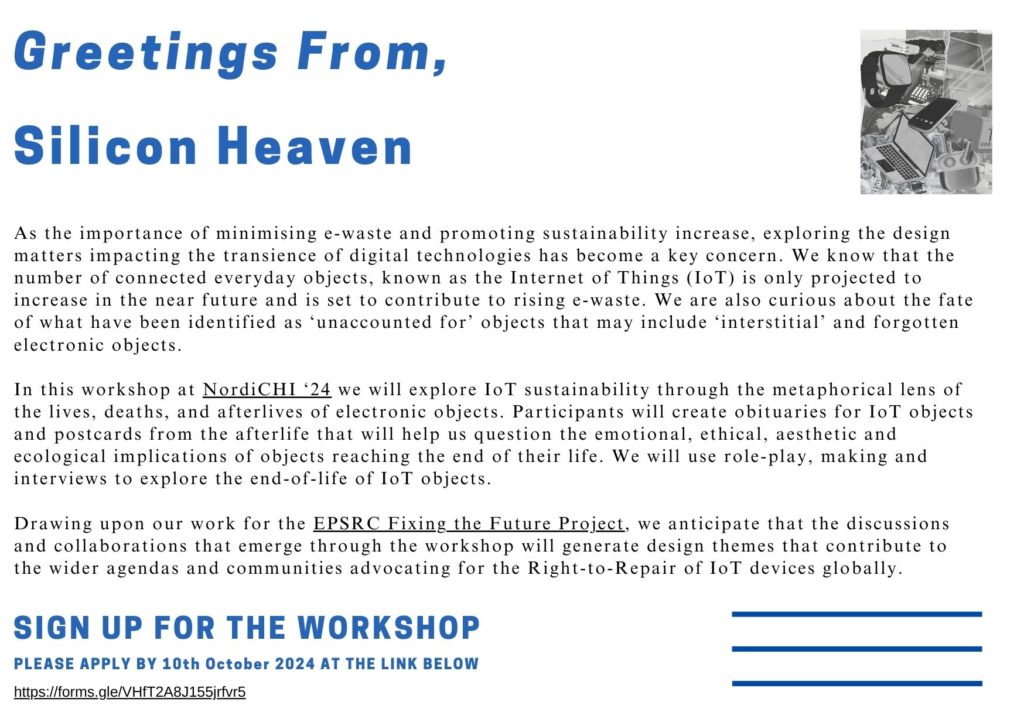
[ Namrata Primlani, Dimitrios Paris Darzentas, Joseph Lindley, Paul Coulton, Neelima Sailaja, Lachlan D Urquhart, Teresa Castle-Green, Michael Stead, Susan Lechelt, Violet Owen, and Nidhi Dubey. 2024. Greetings from Silicon Heaven: Postcards from the IoT Afterlife. In Adjunct Proceedings of the 2024 Nordic Conference on Human-Computer Interaction (NordiCHI ’24 Adjunct). Association for Computing Machinery, New York, NY, USA, Article 58, 1–8. https://doi.org/10.1145/3677045.3685474 ]
2. Anna presented on Personalisation in Media
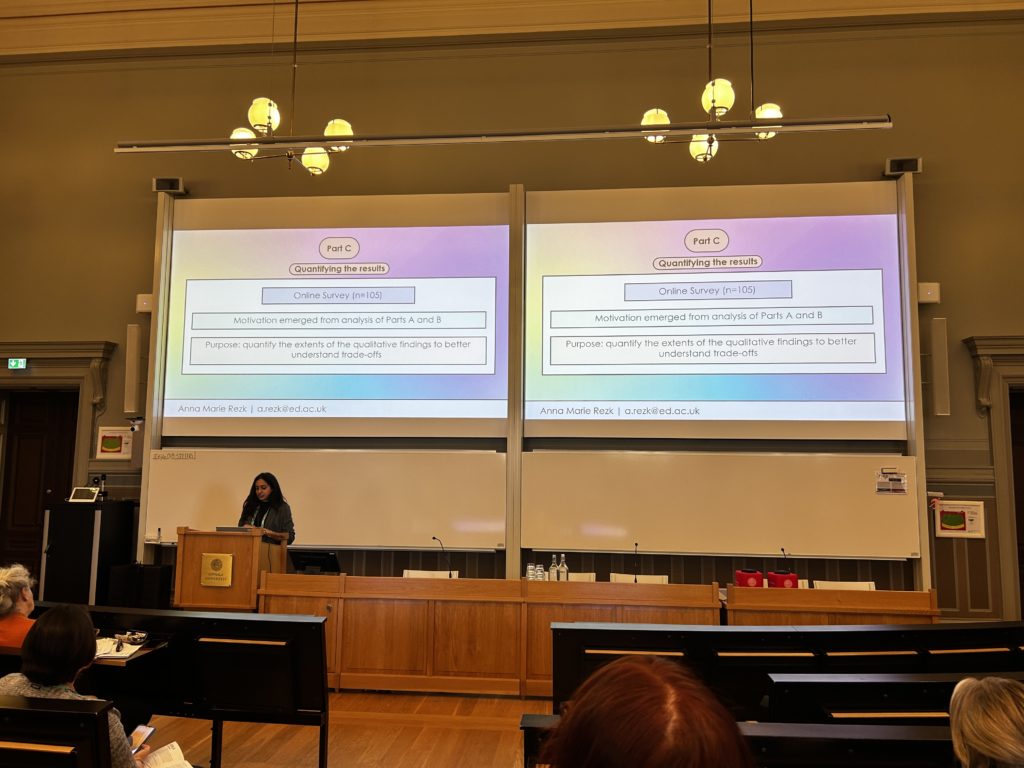
Anna Rezk, one of the designers behind the R2R cards, also presented some of her PhD research on personalisation in media. Her paper highlighted how users often compromise their own comfort to gain the benefits of personalised media. In the context of Fixing the Future, this raises an important question: what moral tensions and internal trade-offs do users of IoT devices experience? Are they satisfied with the convenience these devices offer, yet simultaneously concerned about potential failures? And when breakdowns disrupt routines or workflows – especially with the financial costs involved – what emotions and dilemmas are triggered? How can the right to repair mitigate such dilemmas?
[ Anna Marie Rezk, Auste Simkute, John Vines, Chris Elsden, Michael Evans, Rhianne Jones, and Ewa Luger. 2024. User-Centric Tensions: Exploring Perceived Benefits and (Dis)comfort in Media Personalisation. In Proceedings of the 13th Nordic Conference on Human-Computer Interaction (NordiCHI ’24). Association for Computing Machinery, New York, NY, USA, Article 32, 1–13. https://doi.org/10.1145/3679318.3685365 ]
3. Tanvi presented User Perspectives around Software aspects of IoT Repair

Tanvi presented at her first conference, on the paper exploring User Perspectives around Software and Data-Related Challenges Associated with IoT Repair and Maintenance against Obsolescence. There is a full separate blog post of Tanvi’s experience at NORDICHI 2024 here.
[ Tanvi Vats, Neelima Sailaja, and Fabiana Anselmo Polido Lopes. 2024. Exploration of User Perspectives around Software and Data-Related Challenges Associated with IoT Repair and Maintenance against Obsolescence: User Study on Software and Data Interactions and Considerations for IoT Repair and Maintenance against Obsolescence. In Proceedings of the 13th Nordic Conference on Human-Computer Interaction (NordiCHI ’24). Association for Computing Machinery, New York, NY, USA, Article 48, 1–17. https://doi.org/10.1145/3679318.3685383 ]
4. Lachlan presented the Fixing the Future Cards.
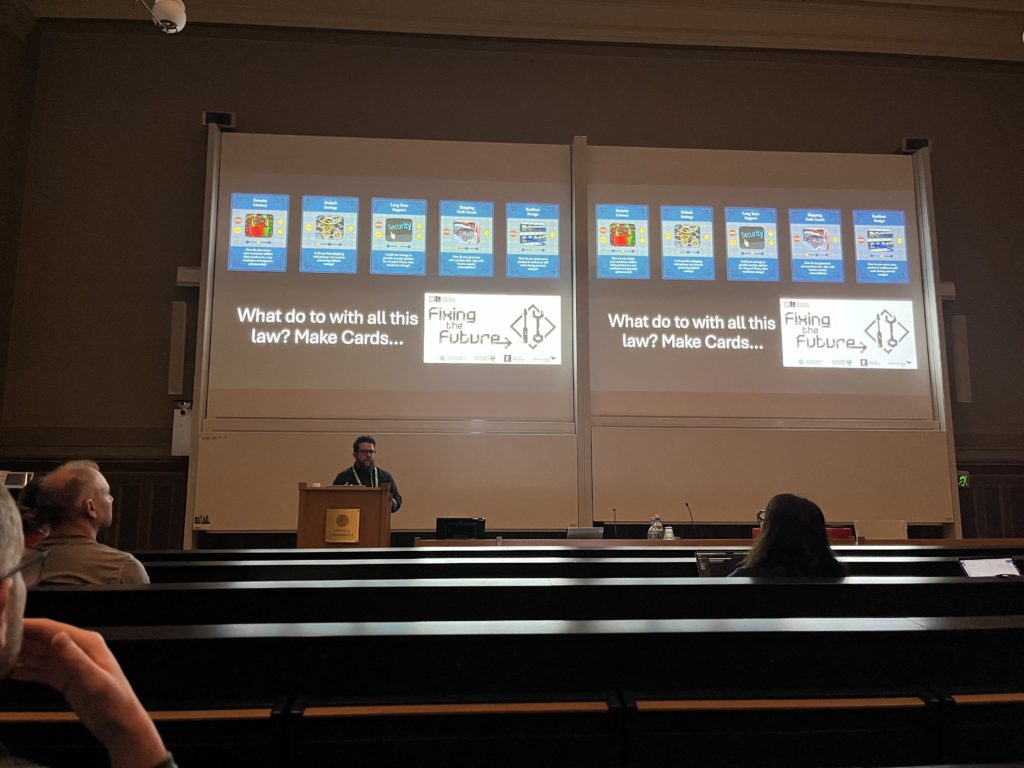
Lachlan presented on behalf of the team about The Right to Repair (R2R) Cards . These are a novel design tool to support development of more sustainable consumer Internet of Things (IoT) devices. It was exciting to present this work, that crosses legal and design research boundaries to the NORDICHI audience. Current IoT systems are not built to last, with planned obsolescence and multiple routes to redundancy due to combined failures in hardware, software, and data management. This ultimately contributes to growing global eWaste. We consider the role of law in encouraging better IoT design practices. Our R2R cards consolidate analysis of 25 pieces of UK / EU legislation and standards, establishing 90 legal requirements around repair, cybersecurity, environmental design, consumer, and data rights. The R2R cards are a novel method for translating legal obligations for IoT system designers and wider stakeholders. We document the card development process, and insights from workshops with 37 participants, evaluating the utility of cards for critical reflection on legal obligations, and supporting transition to more sustainable IoT design.
[ Lachlan D Urquhart, Susan Lechelt, Christopher Boniface, Haili Wu, Anna Marie Rezk, Nidhi Dubey, Melissa Terras, and Ewa Luger. 2024. The Right to Repair (R2R) Cards: Aligning Law and Design For A More Sustainable Consumer Internet of Things. In Proceedings of the 13th Nordic Conference on Human-Computer Interaction (NordiCHI ’24). Association for Computing Machinery, New York, NY, USA, Article 8, 1–20. https://doi.org/10.1145/3679318.3685341 ]
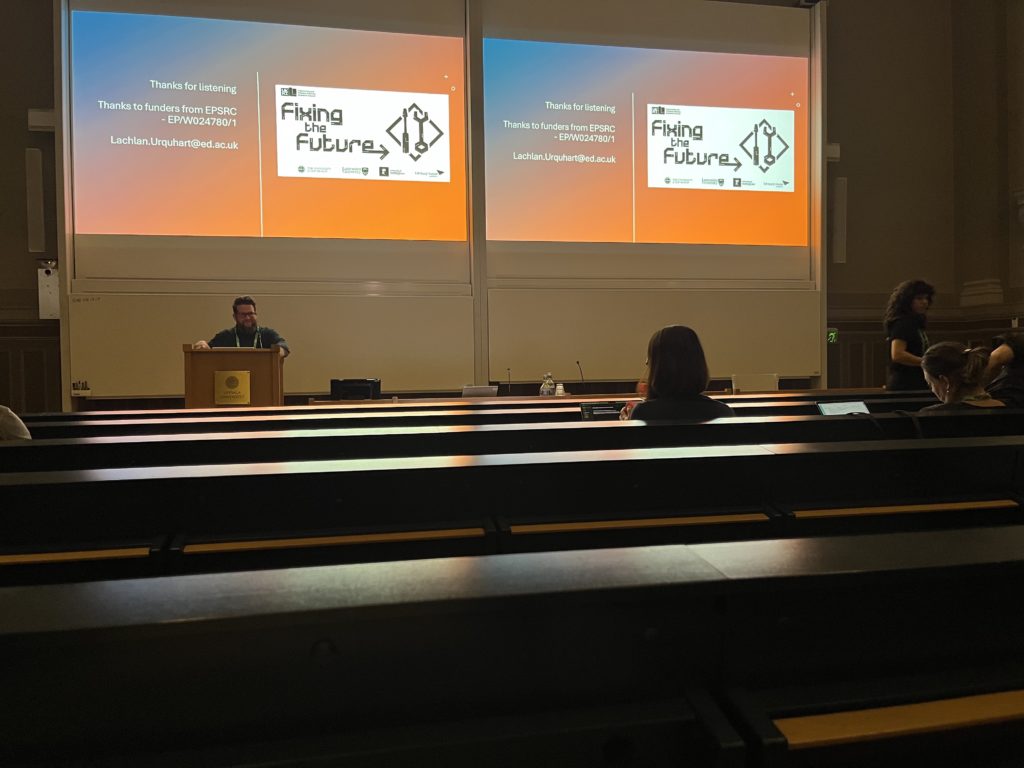
REFERENCES FOR SILICON HEAVEN WORKSHOP
1. Hronn Brynjarsdottir, Maria Håkansson, James Pierce, Eric Baumer, Carl DiSalvo, and Phoebe Sengers. 2012. Sustainably unpersuaded. In Proceedings of the SIGCHI Conference on Human Factors in Computing Systems, 947–956. https://doi.org/10.1145/2207676.2208539
2. Sarah Cooney, Vishal Sharma, Joshua Palmer, Neha Kumar, and Barath Raghavan. 2022. Alternative Pathways to Caring for Limits:The Case of Ecospirituality. In Eighth Workshop on Computing within Limits 2022. https://doi.org/10.21428/bf6fb269.8bd78035
3. Amitai Etzioni and Oren Etzioni. 2016. AI assisted ethics. Ethics and Information Technology 18, 2: 149–156. https://doi.org/10.1007/s10676-016-9400-6
4. Taís Bisognin Garlet, Janine Fleith de Medeiros, José Luis Duarte Ribeiro, and Marcelo Gattermann Perin. 2024. Understanding ethical products: Definitions and attributes to consider throughout the product lifecycle. Sustainable Production and Consumption 45: 228–243. https://doi.org/10.1016/j.spc.2024.01.010
5. Bryce Goodman. 2023. Privacy without persons: a Buddhist critique of surveillance capitalism. AI and Ethics 3, 3: 781–792. https://doi.org/10.1007/s43681-022-00204-1
6. Soraj Hongladarom and Jerd Bandasak. 2024. Non-western AI ethics guidelines: implications for intercultural ethics of technology. AI & SOCIETY 39, 4: 2019–2032. https://doi.org/10.1007/s00146-023-01665-6
7. Lars-Erik Janlert and Erik Stolterman. 1997. The character of things. Design Studies 18, 3: 297–314. https://doi.org/10.1016/S0142-694X(97)00004-5
8. Namrata Primlani, Dimitrios Paris Darzentas, Joseph Lindley, Paul Coulton, Neelima Sailaja, Lachlan D Urquhart, Teresa Castle-Green, Michael Stead, Susan Lechelt, Violet Owen, and Nidhi Dubey. 2024. Greetings from Silicon Heaven: Postcards from the IoT Afterlife. In Adjunct Proceedings of the 2024 Nordic Conference on Human-Computer Interaction, 1–8. https://doi.org/10.1145/3677045.3685474
9. Amana Raquib, Bilal Channa, Talat Zubair, and Junaid Qadir. 2022. Islamic virtue-based ethics for artificial intelligence. Discover Artificial Intelligence 2, 1: 11. https://doi.org/10.1007/s44163-022-00028-2
10. Mohammad Rashidujjaman Rifat, Toha Toriq, and Syed Ishtiaque Ahmed. 2020. Religion and Sustainability. Proceedings of the ACM on Human-Computer Interaction 4, CSCW2: 1–32. https://doi.org/10.1145/3415199
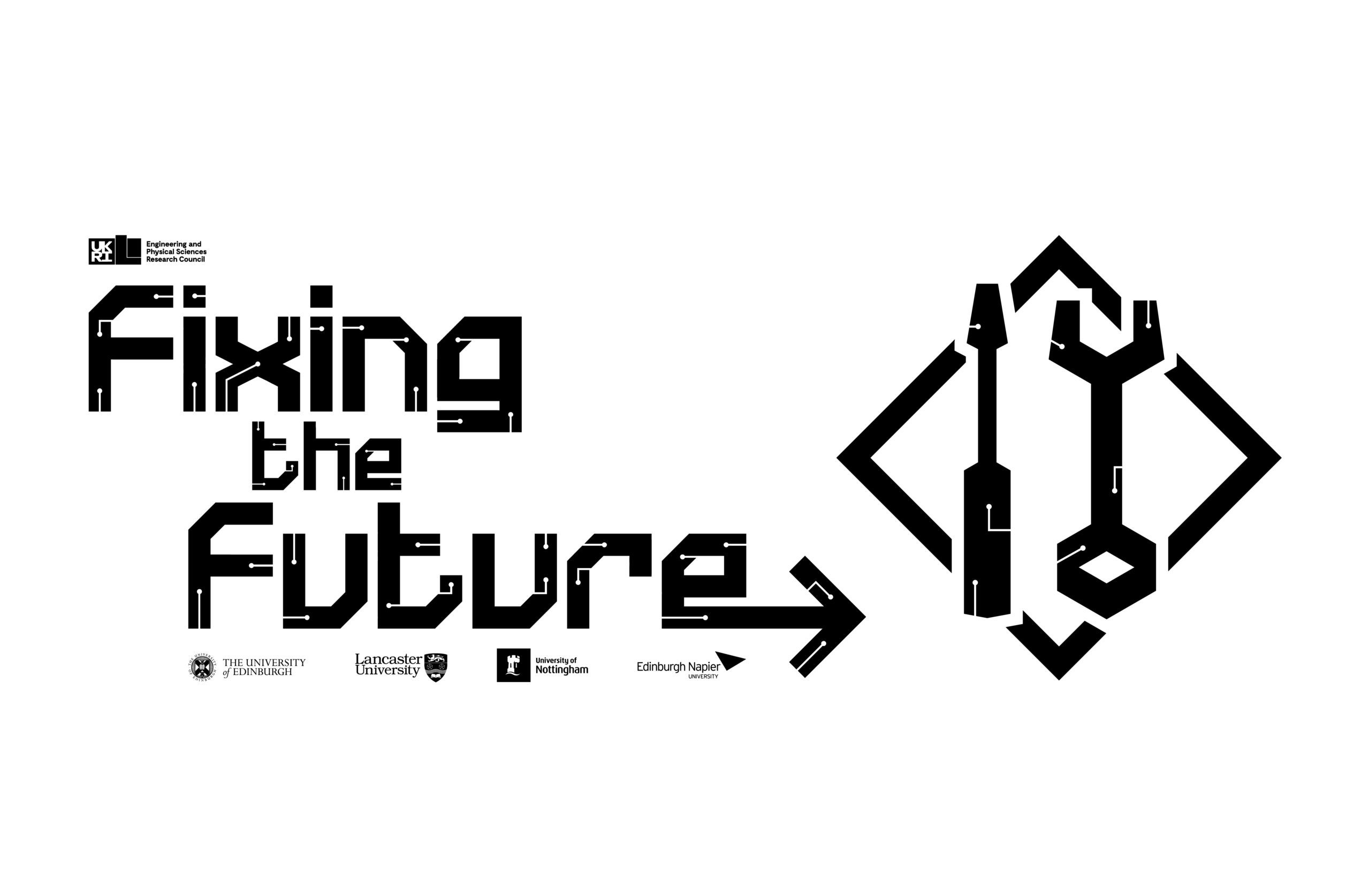
Leave a Reply